
Top Software Development Companies in Japan for Global Tech Talents
Japan is always an attractive destination for tech talents, but finding the right company for foreign talents is not an easy task. We broke through the muddle. Find the top English-speaking Japanese software companies that provide international engineers with the best work-life balance, competitive pay, and expedited visas. Quit speculating and begin applying.
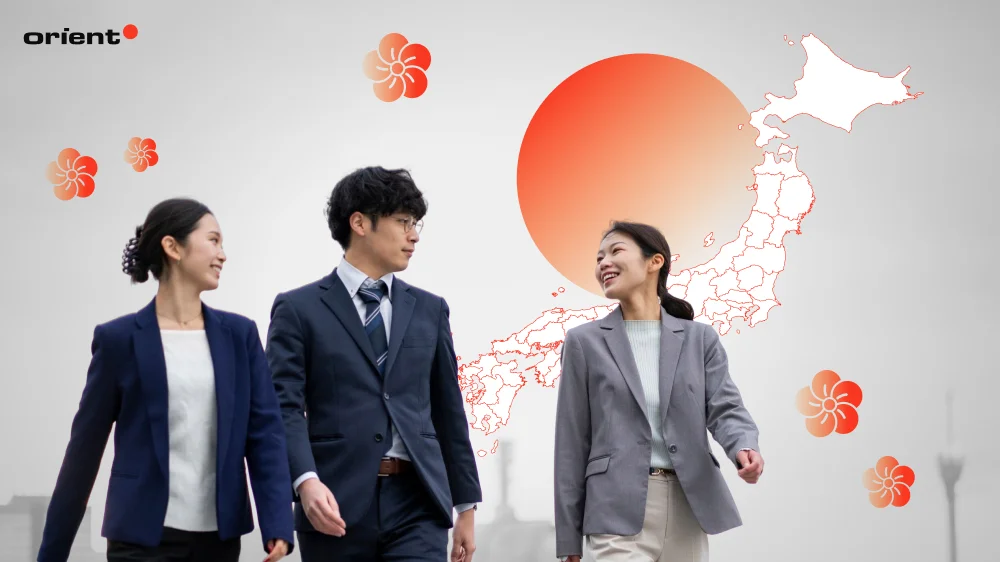
Content Map
More chaptersThe Japanese technology scene is at an intriguing intersection point that takes into account the strong historical practices of the manufacturing industry, combined with the contemporary expectations of the global software industry. In Japan, software development over the decades has been associated with accuracy, partnerships over many years, and closed domestic markets. However, with the pace of international cooperation and the digital revolution, a new generation of software development companies in Japan is reshaping the concept of creating technology.
Contrary to most other Western markets, which are growing exponentially and responding swiftly, the Japanese companies continue to value reliability, quality, and harmony in their patterns of doing business. However, these companies are currently competing to adopt cloud services, AI development, and data analytics in order to stay competitive in the world. What is obtained is a complex and potential market, especially among tech professionals who need jobs that are both technical and cultural in nature.
For international engineers, the decision about where to work in Japan is not necessarily based on whether there is a high salary or visa sponsorship. It is about discovering a company that knows how to cross worlds: local perfection and global cooperation, hierarchy and innovativeness, and tradition and responsiveness. This article approaches this evolution more closely by examining the software companies that are most advanced in those criteria and what makes the best employers stand out in the name of international talent seeking to make Japan their next career stop.
Criteria for Evaluating ‘Best’ Companies for Global Talent
The search for the best software development companies in Japan is concerned not only with the highest pay but also with the most recognized brand name. To global engineers, what really counts lies behind the job description: how a company communicates, makes decisions, and treats people outside of the system. The tech business in Japan has its own standard: it is systematic, precise, and constructed on an unwritten set of rules. To succeed here, foreign talent has to seek employers who not only throw the door open to foreigners but also re-engineer the room in such a way that they can all fit in.
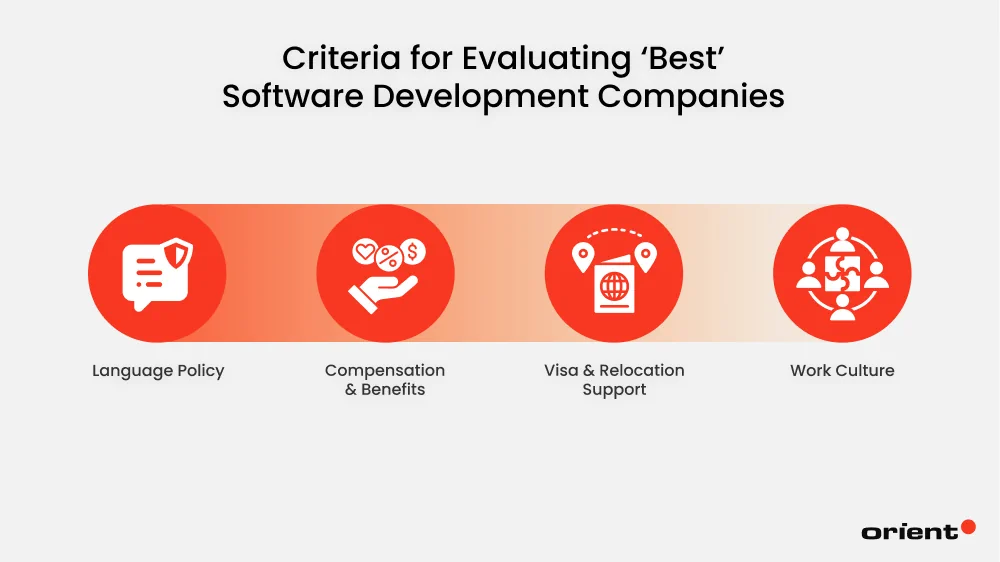
Language Policy
In Japan, language is not just a tool; it is the demarcation of decision participants. A company may proclaim the use of English as okay, but internal documentation, sprint boards, or client meetings should be in Japanese, or the foreign engineer will continue being a spectator rather than a participant. Truly global firms should embrace hybrid systems (or English-first systems) in which engineers work on their default layer of English and not as a courtesy. This change is uncommon; it involves reorganizing the process of documenting, discussing, and aligning teams.
Tips for verifying:
- Compare the English and Japanese versions of the career site or tech blog of the company; are they updated at the same time?
- Interview questions: Do Jira tickets or design documents exist in two languages?
- Watch the rate of meeting language ratio in a trial interview or coding session. Is English used naturally or only in the presence of a foreigner?
- Browse GitHub repositories: The actual working language is often indicated in the issue names, commits, or in the comments to the code.
Compensation & Benefits
The conventional pay model in Japan recognizes seniority instead of contribution, yet global companies that are ready to undertake global activities have updated this system. The competitive companies now scale to international compensation rates (usually USD $60K -120K and up, depending on seniority and location, such as Tokyo or Osaka). They also package physical satisfactions: housing allowance, health insurance, and performance-based bonuses, as well as the observable change of the job-for-life attitude towards career mobility and meritocracy.
How to verify:
- Question: How are the performance reviews done, and how frequently?
- Investigate OpenWork or Glassdoor Japan for salary reviews, and refer to merit-based or clear bonus systems.
- Find remote work policies, relocation allowances, and paid upskilling programs—these are features that are unique to progressive companies as opposed to traditional SIs.
- Consider pay frequency (monthly/biannual bonuses) the companies that are aligned to international standards tend to make this less complicated.
Visa & Relocation Support
It’s common to give a promise of visa sponsorship, but hard to implement well. Global-minded companies do not see relocation as logistics but as a process of getting integrated into living in Japan. In addition to visas, they include temporary accommodation, family visas, in some cases, language lessons or relocation consultants. This kind of support means that they have operational maturity. This means that they have created an internal infrastructure to absorb different engineers rather than employ them.
Tips for verifying:
- Who will be in charge of the relocation: internal HR or an external partner?
- Ask about a sample timeline of relocation: what is the process between the offer and Day 1 in Japan?
- Find actual reviews (“company name” + “relocation experience”), the ones who actually assist are referred to by name.
- When relocating with family, inquire about the assistance of dependents, rare companies provide it, but they are worth considering.
Work Culture
The Japanese work culture has a reputation of being very precise and at the same time infamous due to overwork (karoshi) and bureaucracy. The modern Japanese software development companies are actively changing this dynamic by being less bureaucratic and more creative, letting engineers present ideas, fail and refine them, which is typically hard to find with traditional hierarchies.
How to verify:
- Question: What is the average number of workdays for engineers? Real answers > slogans.
- Browse their social or technology blogs. Do they show team activities and well-being programs?
- Note pacing: Do interviewers comply with breaks and time zones during interviews? That usually represents reality in work-life balance.
- Assuming this is possible, contact existing or former engineers on LinkedIn to get first-hand experience on workload and management openness.
Top Software Development Companies in Japan
Category 1: Global Giants with Strong Japanese Presence
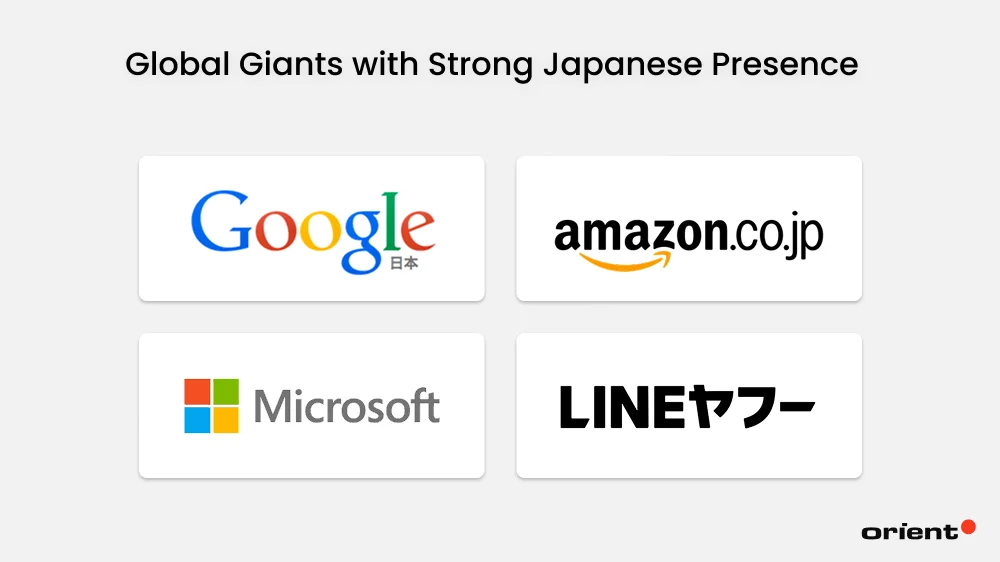
The software ecosystem of Japan could not be complete without the impact of global technology giants. These multinational software houses are where Japan and the world meet and create much of the digital backbone and cloud-first transformation of the country. These companies are seen as the most convenient way to enter the Japanese market by many foreign software engineers and other tech professionals due to their global work cultures and English-first work environments.
Google Japan
Google Japan is based in Shibuya, Tokyo, and has expanded to be one of the largest Asia-Pacific engineering centers of the company. They are very essential in innovating products that are unique to the local user, including the localization of search experience and natural language processing supporting the Japanese language based on AI.
- Employee size: Approximately 3,000+ employees in Japan (as of 2024).
- Focus areas: Cloud infrastructure (Google Cloud Japan), Japanese language processing artificial intelligence applications, and support of the mobile ecosystem (Android, Play).
- Insight: Google Japan is an organization that is keen on recruiting software engineers, data scientists, and AI researchers, most of whom operate in English-speaking teams which act globally. The company also spends a lot on sustainable data centers and AI ethics research in Japan, as it is willing to innovate locally.
Amazon Japan (AWS)
Amazon has an enormous footprint in Japan, not to mention e-commerce as well as cloud computing under AWS Japan. AWS controls about 45% of the Japanese cloud-infrastructure market (IDC Japan, 2024), in which it is the foundation of multiple digital transformation endeavors in finance, manufacturing, and retail.
- Employee size: 7,000+ (Amazon Japan, including AWS).
- Focus areas: Cloud computing, data analytics, automation with AI, and secure systems of enterprise quality.
- Insight: The bilingual culture and work ethics that are globally oriented predispose AWS Japan to be one of the few large-scale environments in Japan where English skills can replace business-level Japanese. The engineers in this division handle domestic and international systems integration projects. In most cases, they are partnered with NTT Data and Hitachi to deploy a hybrid cloud.
Microsoft Japan
Microsoft is one of the oldest established software companies in Japan, having been in operation locally since 1986. They are the key driver of Japan’s digital workplace transformation through Microsoft 365, Azure AI, and cybersecurity consulting for large enterprises. Engineering and product management positions frequently accommodate English-speaking specialists, particularly in cloud architecture, security, and AI product lines.
- Employee size: It has approximately 2,500+ employees
- Focus areas: Specializes in enterprise software, AI solutions, and cloud-first infrastructure as part of Microsoft Azure.
- Insight: Microsoft Japan has been known to have a progressive HR policy, the Work Life Choice Challenge, which was launched in 2019. This initiative included a trial of a four-day workweek, resulting in a 40% increase in productivity and setting a new standard for flexible work arrangements in Japan.
LINE (LY Corporation)
LINE has grown to be more than a messaging platform; it has become a super-app ecosystem encompassing fintech, AI, and digital content services. The merger with Yahoo Japan in 2023, as a part of LY Corporation, has made it one of the strongest internet companies in Japan.
- Employee size: approximately 8,000+ worldwide; around 2,500 in Japan.
- Focus areas: AI development, payment systems, blockchain, and web service integration.
- Insight: The cross-border projects of Japan, Korea, and Southeast Asia make the engineering organization of LINE exceptionally English-friendly. The voice and image recognition models it creates are found in smart devices and in enterprises as a part of its AI department, LINE CLOVA.
Category 2: Unicorns and Modern Tech Pioneers
These companies are the next generation of software development firms in Japan, and they are both startup agile and global in their outlook. They are adopting digital transformation, using AI and cloud-first strategies, and open and diverse engineering cultures. These spirits make them the ideal places for global tech professionals to pursue innovation and impact.

Orient Software
Headquartered in Ho Chi Minh City, Vietnam, and with our new office in Minato-ku, Tokyo, Orient Software is rebranding our whole concept as a global development partner in Japan. Instead of merely providing outsourcing, Orient establishes long-term engineering engagements, assisting Japanese firms in updating their systems and also providing foreign engineers with a significant means of interacting with the Japanese market.
- Employee size: 400+ engineers across Vietnam and Japan.
- Focus areas: Custom software development, AI applications, cloud services, and data analytics to serve clients in the finance, logistics, and manufacturing industries.
- Insight: Orient has a philosophy of partnership, and this is why it stands out among other software development firms in Japan. The Tokyo-based team of the company collaborates with Japanese clients by not only providing them with code but also co-designing new innovative solutions that lead to digital transformation.
To international talents, Orient is a unique asset that gives global talents the opportunity to combine the openness of an international venture with the precision of Japanese companies. The working language is English, although the company makes heavy investments to learn the local business culture in overcoming communication obstacles that tend to complicate cross-border projects.
“At Orient, engineers don’t just assimilate into Japan. We contribute to the development of how technology and partnership take shape in this country. “
With more firms in Japan turning to face outside and satisfy the global demand, the combination of Asian efficiency, international expertise, and Japanese quality standards puts Orient in the status of a truly trusted partner in the process of innovation and long-term development.
Mercari
Inaugurated in 2013, Mercari is the first unicorn in Japan, and it has one of the most established technology brands in the country, located in Roppongi Hills, Tokyo. Mercari has gained the most recognition because of its C2C marketplace application, has emerged as an important force in the mobile and web development industry in Japan.
- Employee size: ~2,100 staff (as of mid-2025).
- Focus areas: Marketplace platform development, AI-driven recommendation systems, data infrastructure, and mobile application engineering.
- Insight: Their policy “Your Choice” enables employees to select remote or hybrid work and on-site work. Having more than 25 % of its staff who are non-Japanese, Mercari is among the very few Japanese software companies that embrace an English-first culture. The company is currently concentrated on AI applications, UX design, and data analytics, and is attracting the attention of engineers who want to work on the high-impact, large-scale platforms.
Money Forward
Money Forward is a top FinTech business headquartered in Minato, Tokyo, and it is making Japan a place where financial services are delivered in the cloud. The platforms cater to both individuals and enterprises, assisting in digitalizing all the tasks, such as managing expenses, to full enterprise accounting systems.
- Employee size: ~2,600 employees (as of 2024).
- Focus areas: Financial systems, SaaS development, cloud accounting, and AI-powered data processing for automation in the financial sectors.
- Insight: Money Forward reflects the increasing interest in the digitalization of Japanese finance. The constant introduction of AI solutions and secure cloud services makes the company one of the most progressive software companies in the country. Its highly friendly hybrid work culture, which is recognized by Great Place to Work® Asia, can be seen as one of the most attractive to both Japanese and foreign software engineers.
Category 3: Traditional Japanese System Integrators & Corporations
This category is composed of companies that have decades of experience in Japan’s technologies and infrastructure. They deal with government, utilities, transportation, and enterprise system projects of a large scale. Though these companies can provide a stable environment, extensive experience in their area of operation, and status, they usually demand that employees speak Japanese in most positions, particularly those involving direct customer contact, and that they have a far more hierarchical structure than startups or unicorns.
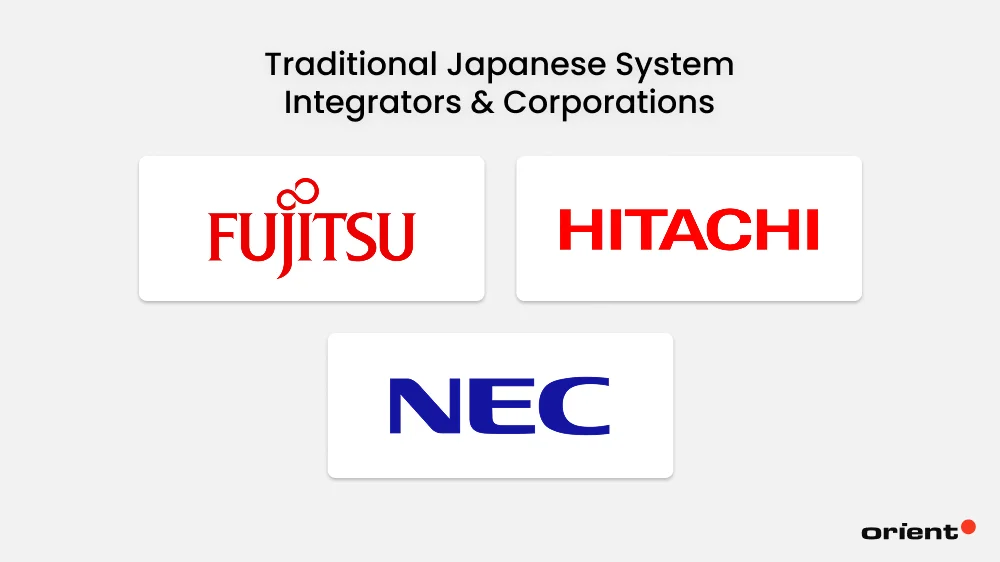
Fujitsu
Fujitsu is among the most established companies in Japan in the field of IT services, hardware, cloud infrastructure, and system integration, with headquarters in Kawasaki, Kanagawa. The enterprise and government technology ecosystem of Japan is entrenched in the company.
- Employee size: ~113,000 full-time employees worldwide as of March 2025.
- Focus areas: Large-scale IT services and consulting for enterprise clients and government. Hardware + systems (servers, materials, infrastructure). R&D investments in AI, data, security, and converging technologies. Cloud services and digital transformation projects.
- Insight: Fujitsu is the leader in terms of market share in Japan, and its revenue is expected to be around 3,550.1 billion yen in FY2024. Nevertheless, its sheer scale means decision cycles tend to be slower. There are bureaucratic layers because of legacy, compliance, and extended customer contracts. To global technical specialists, jobs in this field may provide excellent exposure to critical systems and infrastructure. However, when compared to unicorns, it will have a lower degree of flexibility in work mode (remote/hybrid) and will have a higher focus on Japanese business conventions.
Hitachi, Ltd.
Headquartered in Tokyo, Chiyoda-ku, Hitachi is a diversified conglomerate that cuts across numerous businesses, from infrastructure to digital systems. It has large system integration and social innovation businesses, which tend to combine physical infrastructure with information systems.
- Employee size: ~282,743 consolidated employees as of the end of March 2025.
- Focus areas: Digital Systems & Services (software, system integration, platform services). “Lumada” platform & IoT / generative AI/data analytics for industrial clients. Social infrastructure, utilities, energy, transportation. Many legacy and regulatory-heavy projects.
- Insight: The size of the projects that Hitachi can access is not available to many other companies: national infrastructure, large-scale energy, mobility, and industrial systems. However, in the case of global engineers, these positions might have a more strict organization, greater demands to communicate in Japanese (both internally and to clients), and reduced latitude to make tools or process innovations. The focus on AI and cloud (e.g., the Microsoft partnership) may indicate that Hitachi is taking a step towards more current models, but cultural and procedural change is usually slow.
NEC Corporation
NEC, which is based in Minato-ku, Tokyo, has played a fundamental role in the provision of telecommunications, public sector, and social infrastructure technology in Japan. It is a combination of systems integration, equipment, and software services.
- Employee size: ~104,194 employees (consolidated) as of March 31, 2025.
- Focus areas: IT services business and systems integration, especially for the public sector, telecom operators (OSS/BSS), disaster prevention, and broadcasting. Social Infrastructure (networks, communications, defense/aerospace systems). Cloud services, maintenance & support, platform software – though many projects are heavily regulated, with long lifecycles.
- Insight: NEC is strong in terms of reliability, compliance, and embeddedness into controlled environments. NEC is stable and domain-rich for the person who is interested in system architecture, networks, and infrastructure engineering. Conversely, more modern paradigms such as fast iteration, startup-style autonomy, or English-first teams are not widespread here (although initiatives such as innovation labs/open innovation challenges are moving in that direction).
Top Qualities Japanese Companies Seek in Global Tech Talents
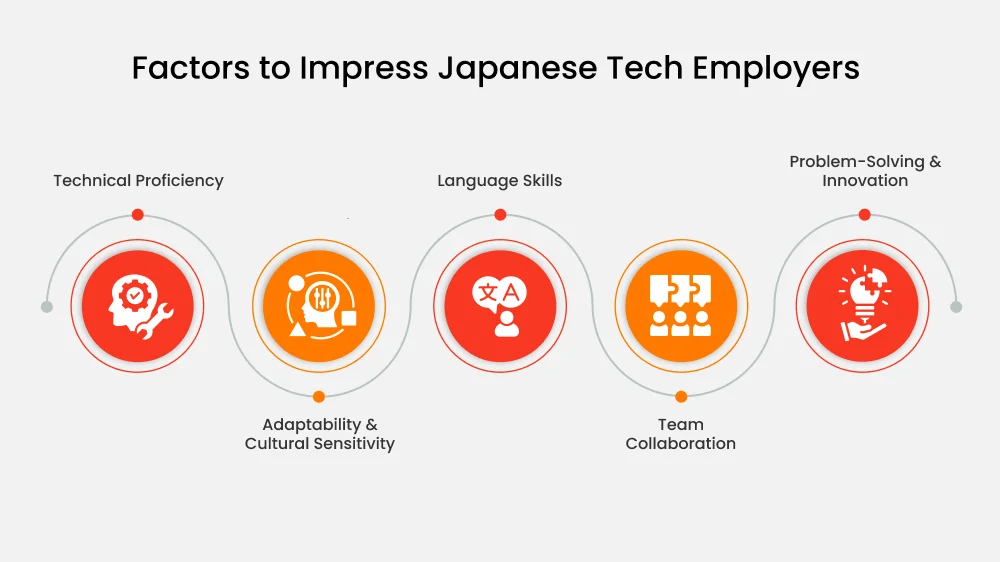
Technical Proficiency
Good coding abilities are a prerequisite, yet in Japan, they are only a starting point. What is far more important than knowing Java or Python is understanding how to construct systems that will endure and how to make them both stable and secure as well as serviceable decades later.
For example, in Nomura Research Institute, the staff of the financial analytics department can earn about 8M yen annually, not because they pursue the latest tools, but because their systems do not collapse when trading at their peak volume. The Japanese corporations synonymous with technical mastery and trustworthiness: It is not about how fast you can get your code into practice, but how much confidence your clients have when the code you write is running.
Adaptability & Cultural Sensitivity
Professionalism and hard work are anticipated everywhere, but in Japan, adaptability has an additional layer. It involves having the ability to read between the lines: the silence at a meeting is approval, or someone saying he will get back to me will be interpreted as a denial in a polite way.
Consider the case of SCSK Corporation, which implements projects with clients as Toyota and Mizuho Bank. Their teams work in mixed configurations with the Japanese PMs, offshore Vietnamese or Filipino engineers, and global consultants, and their communication is not 24 hours a day, but rather planned. Meetings are infrequent, but every word carries weight. Those engineers who know this rhythm (when to clarify, when to confirm, and when to merely acknowledge) are the ones who are relied upon to organize multinational projects. Such awareness does not appear on a CV, but it usually determines who gets out of being a coder to become a project lead.
Language Skills
Understanding Japanese is always the gateway that global tech talents encounter while working in Japan. Communication is facilitated by speaking Japanese, and more than communication, it’s a key to visibility.
Most of the engineering expertise of Japan, whether in documents or in notes to the legacy system, is only found in Japanese. Those engineers who are able to go through that layer have received access to the context that others never access. Numerous product specifications and old API documentation are still in Japanese and were written long before the English-first policy was implemented. The people who cross that divide usually fall into solution architect positions with incomes exceeding ¥9M annually.
Team Collaboration
Teamwork is exalted by every software culture, but in Japan, it has a more nuanced form, one that is constructed on the concept of consistency and memory of trust. The developer who works quietly to meet every deadline carries more weight than the star who shines once. This trustworthiness gathers over time into influence. The Japanese team dynamic is based on the principle of rewarding the reliable and not the theatrical, and that is why teamwork here does not feel like performance, but rather an extended game of confidence earned.
Problem-Solving & Innovation
Japanese firms value structured problem-solving, focusing on precision and continuous improvement. As they keep on expanding internationally, they are demanding more and more tech professionals who can add to this with creativity, flexibility, and cross-cultural understanding. As a global candidate, the ability to consider issues in several ways and propose feasible, evidence-based solutions is one of their strengths. Employers are fond of those who challenge the prevailing procedures and suggest ways of improving them, as well as members of various teams.
Working abroad or in cross-cultural settings provides an understanding of preparedness to work in the globally oriented workplaces in Japan. Most importantly, integrating critical thinking and empathy, knowing the technical issues as well as the needs of the users, can make global talent shine. A combination of both approaches in Japan, discipline and creative innovation, gives professionals an opportunity to make significant contributions to product development and enhances their career opportunities in Japan.
Actionable Job Hunt Guide for Global Talent

Where to Look
Most people looking for jobs around the world start with well-known job sites, but Japan’s tech scene has a few that are especially reliable. TokyoDev, Japan Dev, and GaijinPot Jobs are some of the sites that list jobs where English is used on the job, not just tolerated.
This difference is important because some “English OK” listings still want you to speak Japanese every day. You can find out if a company’s culture really supports working with people from other countries or if they just use English to talk to people outside the company by reading their profiles carefully. As mentioned in the first section, another strategy is to look at tech blogs or GitHub repos for companies. Japanese companies that write in English are usually the ones that are really open to hiring engineers from around the world.
The Resume Shift
Western CVs often highlight leadership titles, measurable achievements, and career progression. In Japan, however, recruiters and hiring managers pay closer attention to technical depth, reliability, and consistency.
The Japanese rirekisho (resume) is standardized and brief, but what really differentiates you is your “shokumu keirekisho” (職務経歴書), the detailed career history you attach. This is where you should emphasize how you contributed to long-term product stability, not just project size or revenue impact. In Japan, that endurance says more about your value than fast-paced project switching.
Visa Sponsorship
Most international engineers in Japan work under the Engineer / Specialist in Humanities / International Services visa. The paperwork is usually handled by the hiring company, but here’s the nuance: immigration authorities evaluate your degree relevance and work experience match very strictly.
A degree in computer science makes the process smooth, but even without it, strong documented experience (especially from reputable employers) can secure approval. Another point often missed is that companies are more likely to sponsor visas when they see you as a long-term contributor, not a short-term contract hire. Mentioning your intent to stay and grow in Japan, even briefly, can make a real difference in how HR perceives your application.
Conclusion
If you’re serious about working in Japan, start by exploring English-friendly job platforms and studying how Japanese firms communicate their values. Tailor your resume to highlight technical reliability and teamwork, not just achievements. Learn the basics of Japan’s work culture and visa process early; it signals professionalism and respect.
The path into Japan’s tech ecosystem may seem structured, but it rewards those who prepare thoughtfully. So, don’t just wait for the right opportunity, do research, connect, and start shaping your profile for Japan’s global future. The companies ready to welcome you are already out there; the next move is yours!






